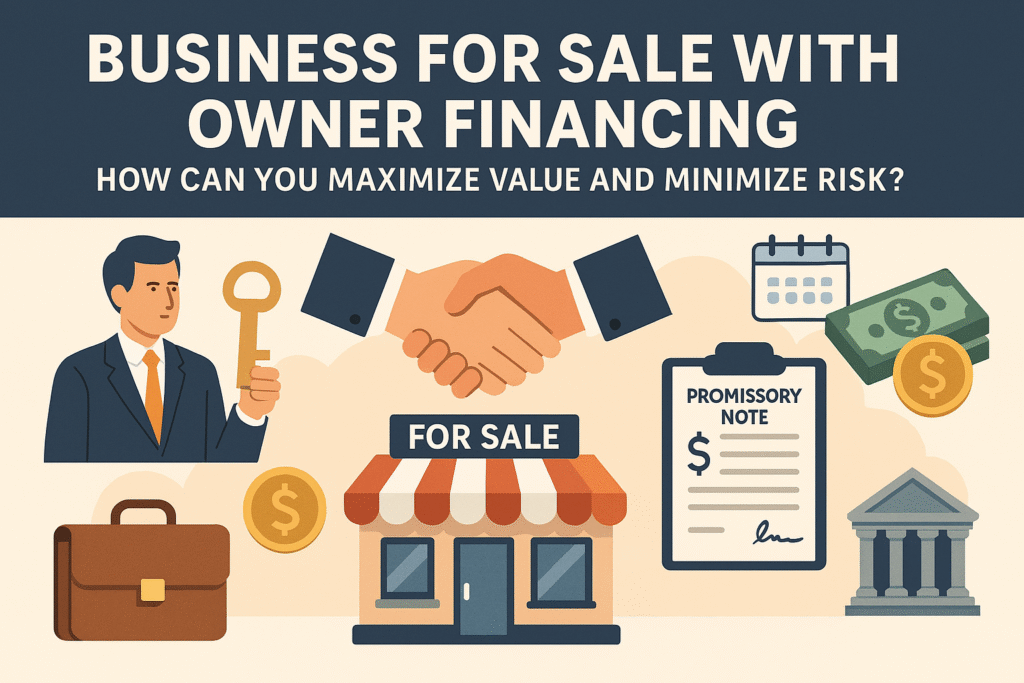Owner financing allows you to sell or buy a business without relying on traditional bank loans. Buyers make payments directly to sellers. This method creates flexibility, expands buyer access, and accelerates deal closure.
What Makes Owner Financing a Strategic Option?
Owner financing works as a private agreement. You avoid bank delays and negotiate terms directly. Buyers benefit when credit is limited. Sellers gain leverage to justify higher prices.
Buyers with weak credit or limited collateral gain access
Sellers attract more offers and close deals faster
Both parties avoid institutional red tape
How Does Owner Financing Work in Practice?
You structure the deal using clear financial terms. Each component protects both sides.
| Element | Purpose |
| Down Payment | Buyer pays 30–50% upfront to reduce seller exposure |
| Promissory Note | Legal document outlines loan amount, interest rate, and default terms |
| Repayment Term | Monthly payments span 3–7 years with interest |
| Collateral | Seller retains rights to business assets until full repayment |
What Do Buyers Gain from Owner Financing?
Buyers face fewer barriers. You avoid bank scrutiny and reduce upfront costs.
Approval becomes easier without institutional requirements
Terms adjust based on your financial capacity
Closing moves faster with fewer documents
Bank fees like origination and underwriting disappear
According to BizBuySell, over 60% of small business listings offer some form of seller financing, showing its growing popularity.
What Do Sellers Gain from Owner Financing?
Sellers unlock new advantages. You attract more buyers and build long-term income.
Buyer pool expands beyond bank-qualified candidates
Sale price increases due to added flexibility
Interest payments create passive income
Tax liability spreads across multiple years
IRS Publication 537 outlines how installment sales defer capital gains taxes, helping sellers manage tax brackets more effectively.
What Risks Should Buyers Consider?
Buyers must prepare for financial pressure. You face stricter repayment terms and fewer legal protections.
Interest rates often exceed bank standards
Final balloon payments may require refinancing
Legal safeguards remain limited without institutional backing
Missed payments can lead to asset loss
What Risks Should Sellers Consider?
Sellers must vet buyers carefully. You depend on their ability to operate and repay.
Missed payments trigger repossession or legal action
Immediate liquidity remains unavailable
Business involvement may continue post-sale
Buyer due diligence requires time and expertise
According to the Small Business Administration (SBA), seller-financed deals often fail due to poor buyer vetting, making pre-sale analysis essential.
How Can Sellers Protect Their Interests?
Sellers need a structured approach. You reduce risk through planning and oversight.
1. Assess Buyer Strength
Review credit history, business experience, and financial projections. Weak buyers increase default risk.
2. Secure Legal Protections
Use collateral agreements and personal guarantees. Consult legal advisors to draft enforceable contracts.
3. Monitor Business Performance
Stay involved during the transition. Track cash flow, customer retention, and operational metrics.
Can Seller Financing Work with SBA Loans?
SBA-backed deals often include seller financing. You may use it to meet equity injection requirements.
Buyers must contribute around 10% of project cost
Seller financing can fulfill part of that requirement
SBA rules vary by lender and region
Always consult an SBA-approved lender before structuring the deal.
How Do Taxes Work in Seller-Financed Sales?
Installment sales allow proportional basis allocation. You defer capital gains and reduce tax impact.
Example Breakdown:
Sale Price: $1,000,000
Upfront Payment: $900,000 (bank loan)
Seller Financing: $100,000 over 5 years
Seller’s Basis: $200,000
You allocate a basis between the lump sum and the financed portion. IRS compliance ensures proper gain recognition.
Can Real Estate Be Reinvested Tax-Free?
Real estate within the business sale qualifies for a 1031 exchange. You defer capital gains by reinvesting.
Identify replacement property within 45 days
Close on new property within 180 days
Follow IRS rules strictly to maintain eligibility
According to the National Association of Realtors, 1031 exchanges save investors billions annually in deferred taxes.
What Should You Do Next?
Owner financing creates opportunity. You gain flexibility, income, and strategic tax advantages. Risks exist, but smart planning protects your interests.
Would you like keyword clusters, meta descriptions, or image concepts next? I can also generate schema markup or internal linking strategies to boost your rankings.
FAQs
What defines owner financing in a business sale?
Owner financing creates a private loan between seller and buyer. The buyer pays part upfront and completes the payment over time through direct installments.
Why do sellers choose owner financing?
Sellers expand their buyer pool and justify higher prices. Interest payments generate passive income. Tax deferral becomes possible through installment structuring.
How much upfront payment do buyers provide?
Buyers usually contribute 30% to 50% of the total price. That amount reduces seller exposure and confirms buyer commitment.
What documents secure the transaction?
A promissory note outlines loan terms, interest rate, and repayment schedule. Collateral agreements protect seller rights over business assets.
What duration applies to repayment?
Repayment spans 3 to 7 years. Monthly payments include interest and principal.
Can SBA-backed deals include owner financing?
SBA deals may include seller financing as part of the buyer’s equity injection. Lender policies vary. An SBA-approved advisor provides accurate guidance.
What risks affect buyers in owner-financed deals?
Buyers face higher interest rates and balloon payments. Legal protections remain limited. Missed payments may lead to asset loss.
What risks affect sellers in owner-financed deals?
Sellers depend on buyer performance. Missed payments delay income. Continued involvement may be required. Due diligence protects long-term outcomes.
How does owner financing impact taxes?
Installment sales allow proportional basis allocation. Capital gains taxes spread across multiple years. IRS compliance ensures proper reporting.
Can sellers reinvest real estate proceeds tax-free?
A 1031 exchange defers capital gains taxes. Sellers must identify replacement property within 45 days and close within 180 days. IRS rules apply strictly.
Stay updated with the latest trends and insights at quickfast.blog



